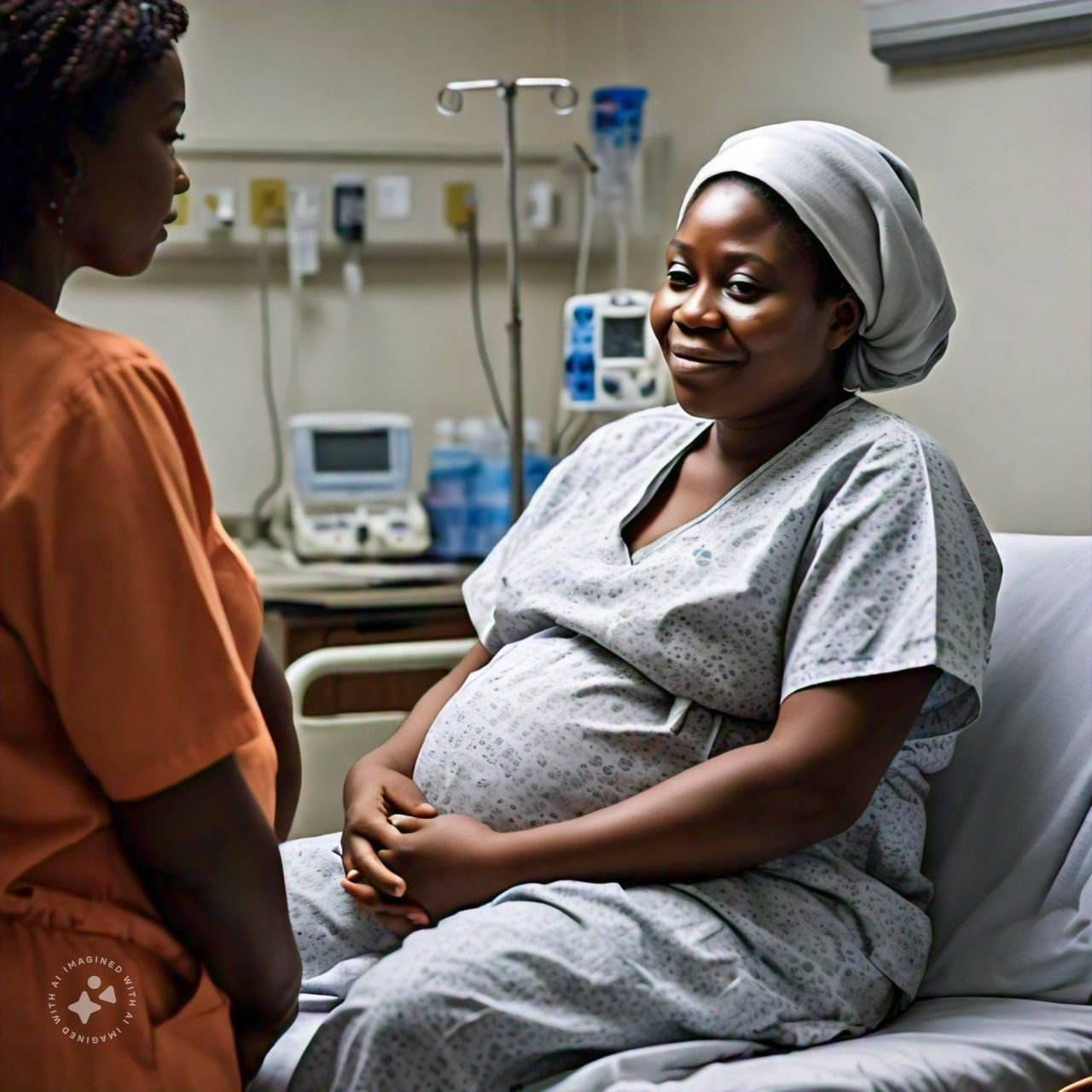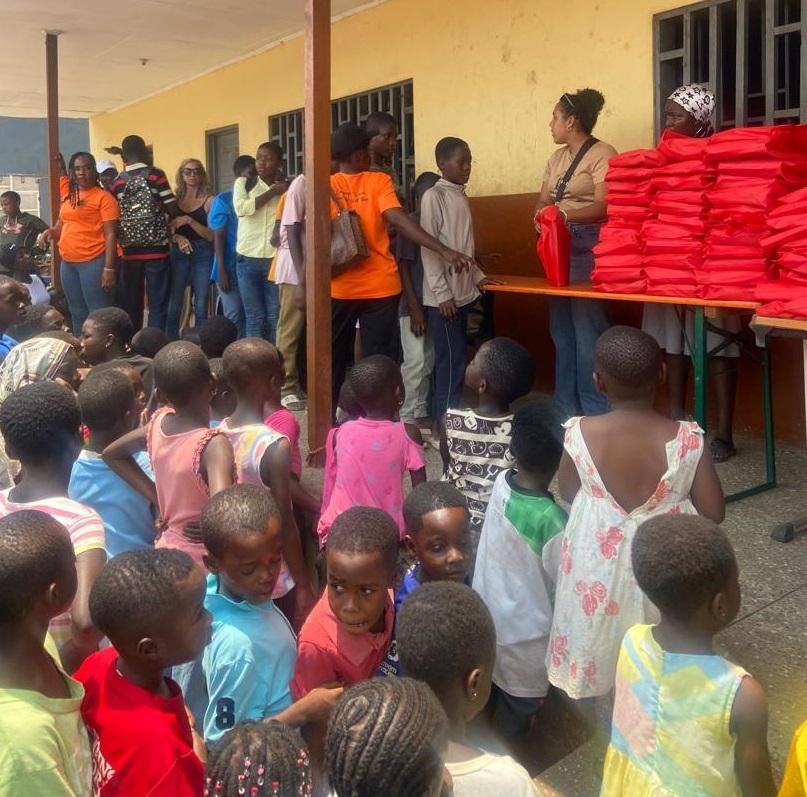News
“The Silent Struggles of Deaf Pregnant Women Accessing Healthcare in Ghana”

A baby’s first cry needs no translation, no interpreter, and no explanation. Yet, for deaf mothers, their own cries for help and understanding echo silently through Ghana’s healthcare system.
In crowded waiting rooms, they watch other mothers freely communicate with healthcare providers, sharing joys and concerns about their growing babies. Yet, their own questions go unheard.
When doctors speak, they catch only silence. When nurses give vital instructions, the words vanish unseen. For them, the journey to motherhood isn’t just about bringing new life into the world – it’s about being understood in a system that speaks a language their hands know but their doctors don’t.
Twenty-six-year-old Bilkisu, a soyabean seller from Gyangyanadze in the Efutu Municipal District of Ghana’s Central Region, is currently pregnant with her second child.
However, the harrowing experience of her first pregnancy still lingers in her mind. From being sidelined during early antenatal visits due to communication barriers to receiving incorrect prescriptions that nearly caused her to miscarry, to enduring labour for nearly six hours, the trauma still brings tears to her eyes.
“On the day of delivery, I got to the hospital around 6:00 pm, but it was midnight before I could deliver my baby. Even then, it took my mother’s intervention to force the nurses to attend to me. The stigma and discrimination, even at the point of care, are terrible,” said the four-months-pregnant woman, who is also married to a hearing-impaired husband.
In contrast, Cynthia Addo, now in her third trimester with her third child, represents a rare success story. As a teacher at the Tetteh Ocloo State School for the Deaf, she has benefited from support systems that many deaf women lack.
“Fortunately for me, my parents are speakers, and whenever I go for a check-up, they ensure I have a family member or friend who works in the hospital to assist me. In all my pregnancies, I’ve never had to change doctors or nurses. I have one team throughout, and whenever I need to visit the hospital, I ensure they are around. But what about the many others who are not as privileged as I am?,” she expressed with concern.
The stories of Bilkisu and Cynthia highlight a broader crisis. Ghana’s estimated 200,000 hearing-impaired individuals form part of the two million Persons with Disability (PWD) population, representing 8% of the nation’s populace.
For deaf pregnant women, the lack of sign language interpreters, inaccessible medical equipment, and insufficient training for healthcare professionals to provide specialised care creates dangerous gaps in maternal healthcare services.
In 2006, Ghana made history as one of Africa’s first countries to pass a Persons with Disability Act (Act 715). This law promised rights to accessibility, employment, and education. By 2012, the country ratified the United Nations Convention on the Rights of Persons with Disabilities (CRPD), committing to healthcare without discrimination.
As a United Nations Member State, Ghana pledged to achieve universal health coverage (UHC) by leaving no one behind and ensuring access to quality health services without financial hardship by 2030, under Sustainable Development Goal 3.
Yet, despite these commitments, the reality remains stark. Several studies on the rights and dignity of PWDs in Ghana reveal disparities, including physical, attitudinal, and financial barriers to healthcare access.
In maternal healthcare, barriers such as inaccessibility, communication challenges, and lack of tailored support services for deaf pregnant women contribute to Ghana’s maternal mortality ratio (MMR) of 319 per 100,000 live births – far above the WHO’s target of 70 per 100,000 live births by 2030.
Mabel Adjei Mintaah, General Secretary of the Ghana National Association of the Deaf (GNAD), confirms reports of many hearing-impaired pregnant women avoiding healthcare facilities and delivering at home due to the attitudinal and communication barriers of healthcare workers.
“There are health workers who make derogatory comments about why a disabled person should have sex and be pregnant in the first place. But deaf people, especially women, have the right to reproductive health and to making families like all other persons,” she emphasised.
Ms Mintaah called for enforcing policies to ensure that all healthcare facilities have at least one sign language interpreter to assist deaf individuals. This, she stressed, is a critical step toward bridging existing gaps and saving lives.
David Awusi, Executive Director of Youth Rise International (YORI), a civil society organisation promoting health equity, expressed concern over the neglect of basic sign language training in medical institutions.
“Additionally, there are no national standard operating guidelines for disability care in the healthcare system. These issues must be urgently addressed to uphold the health rights of PWDs, especially pregnant women and adolescents, and ensure they are treated with dignity,” he urged.
Juventus Duorinaah, Ghana’s first hearing-impaired lawyer and a human rights activist, attributed stigma, discrimination, and marginalisation to the call for amending the PWDs Act of 2006.
“Deaf people and PWDs face numerous stereotypes and discrimination. We urge Parliament to expedite action on the revised bill to ensure it becomes more relevant and responsive to the current needs of PWDs in Ghana,” he stated.
The Programme Coordinator for Disability Inclusion and Healthcare Delivery at the Ghana Health Service (GHS), Patience Ofosuhemaa, explained that Ghana is drafting its first policy on disability inclusion in healthcare delivery. This policy aims to address the gaps faced by PWDs and is expected to be operational by the end of the first quarter next year.
The policy will include training service providers in disability care, creating disability desks at healthcare facilities, appointing at least one sign language interpreter at the district level, and addressing physical infrastructure inaccessibility progressively.
“The GHS initially considered all Ghanaians as one in healthcare delivery. However, a 2022 baseline survey revealed knowledge gaps among health staff, barriers in information dissemination, and issues with physical accessibility. These findings underscore the need for inclusive healthcare,” she said.
With 8.8% of females in Ghana suffering from disability conditions compared to 6.7% of males, Ms Ofosuhemaa stressed the urgent need to bridge existing inequities in healthcare access.
As Bilkisu poignantly remarked, “I just want to be treated with dignity and respect. I want to understand what’s happening to my body and my baby.”
This reporting was completed with the support of the Centre for Journalism Innovation and Development (CJID) in partnership with the Institute for War and Peace Reporting.
BY ABIGAIL ANNOH
News
Assembly man shot dead in Aboabo

A wave of grief has swept through the Amansie West District over the fatal shooting of the Assembly Member for Aboabo, Samuel Danquah, during a violent clash between residents and armed military personnel at a mining site in Mpatuam on Tuesday.
Samuel Danquah was killed when military men opened fire on angry residents in Mpatuam. Two other people were also shot and are in hospital.
The trouble started on Monday, September 8, when local people said security guards from Asanko Mines killed a miner.
On Tuesday, hundreds of young people blocked the roads to the mining site, demanding justice for the dead man.
Danquah went to the scene to talk to the protesters and calm them down. But when soldiers arrived, they started shooting. Danquah was hit by a bullet and died at the hospital.
“Danquah came to help calm the situation,” said Kwame Sakyi, an Assembly Member for Mpatuam, who saw what happened. “He believed in talking through problems.”
After the shooting, the angry crowd set fire to vehicles and equipment belonging to the mining company. The whole area is now very tensed.
“The situation is out of hand,” Sakyi told reporters. “The youth are devastated. They feel unheard, unsafe, and betrayed. We’ve lost a respected leader and the people are demanding answers,” he added.
This is not the first time such troubles between mining companies and local communities in Ghana has been recorded. Many people living near mines say the companies make money from their land but give nothing back to them.
They complained that the mining is destroying their farms and water sources while they remain poor. When they protest, security forces often use force against them.
Sakyi is asking the government to investigate what happened and find out why soldiers shot at unarmed people. He wants to know why a respected community leader was killed while trying to make peace.
“While mining brings economic opportunities, communities continue to feel left out,” he explained, adding that, “We need better ways for people to talk about their problems without violence.”
Community leaders and civil society groups are also calling on the government to step in and prevent more violence in mining areas.
People who knew Danquah said he was always trying to help solve problems peacefully. His family and friends are shocked that he was killed while trying to prevent a commotion.
The funeral arrangements are being made while the community mourns a leader who died trying to serve his people.
Many opinion leaders believe the incident shows how dangerous the situation has become in Ghana’s mining areas, where conflicts between companies and communities are getting worse instead of better.
From Kingsley Hope, Kumasi
Join our WhatsApp Channel now!
https://whatsapp.com/channel/0029VbBElzjInlqHhl1aTU27
News
Street Academy distributes learning material to over 200 pupils

The Street Academy in Accra last weekend distributed exercise books, pens and other learning material to over 200 pupils from the Academy and neigbouring children within the vicinity.
The gesture was an annual activity of the Academy to commemorate its ‘Back-to-School’ programme aimed at equipping children with essential school supplies as they prepare for the new academic year.
Held at the precincts of the Academy, it brought smiles to the faces of the children most of whom were drawn from the streets.
Each beneficiary was presented with items such as notebooks, exercise books, pens, pencils, erasers, sharpeners, rulers, mathematical sets, and other school essentials, ensuring they were well-prepared to begin their studies with confidence.
Speaking to the media, the Founder and Director of the Street Academy, Ataa Lartey, expressed joy and appreciation over the support the Academy continues to enjoy from institutions and individuals.
According to him, some of these donations cannot be possible if individuals, corporate and religious bodies fail to support.
Ataa Lartey extended special gratitude to a Director of the Academy and a philanthropist, Nii Boye Abbey, who donated the items to the Academy for onward distribution to the needy children.
Mr Abbey presented the stationery worth GH¢68,000 to the Academy as part of his 61st birthday celebration for onward distribution to the needy children.
“We are grateful to Mr Abbey especially and other donors. His presentation went far to support the Academy’s ‘Back to School’ project that supports the children’s return to school.”
He thanked the media for the extensive publicity given to the Academy’s programmes over the years and expressed hope that this support would grow even stronger in the years ahead.
“We believe that as you sow into the lives of these children, God will continue to bless and reward you abundantly,” he said.
The Street Academy is a sports and culture organisation that draws children from the street and support them with education and teach others with skills in various sectors including sports to make an earning for themselves.
It is known for its commitment to providing education and skills training for street children and underprivileged youth and it continues to serve as a beacon of hope in the community, transforming lives through education, sports, and arts.
By Spectator Reporter
Join our WhatsApp Channel now!
https://whatsapp.com/channel/0029VbBElzjInlqHhl1aTU27












